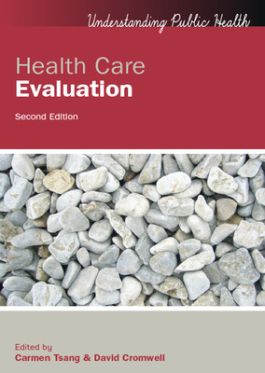Health Care Evaluation
- Access the eBook anytime, anywhere: online or offline
- Create notes, flashcards and make annotations while you study
- Full searchable content: quickly find the answers you are looking for
Chapter 1 Introduction to health and health care
Chapter 2 Introduction to health care evaluation
Section 2 Measuring outcomes of care
Chapter 3 Measuring disease
Chapter 4 Measuring functional ability and health-related quality of life
Section 3 Evaluating effectiveness: the role of study design
Chapter 5 Introduction to study designs
Chapter 6 Experimental studies: randomized designs
Chapter 7 Experimental studies: non-randomized designs
Chapter 8 Observational study designs
Chapter 9 Ecological study designs
Section 4 Economic evaluations
Chapter 10 Economic evaluation in health care
Chapter 11 Economic evaluation in practice
Section 5 Evaluating humanity
Chapter 12 Humanity in health care
Chapter 13 Evaluating patient experience
Section 6 Evaluating equity
Chapter 14 Defining equity in health care
Chapter 15 Evaluating equity
Evaluation of health care is necessary if we are to understand the organisation of health services and to determine how health care interventions should be delivered. The second edition of this fully revised public health text introduces the various types of health care evaluations, and explores the ways in which scientifically robust studies can be used to assess health care interventions, with a focus on measuring their impact on patient outcomes.
Throughout this book, the concepts and methods of evaluating health care interventions are considered in terms of four key dimensions: effectiveness, efficiency, humanity and equity. In order to fully equip the public health practitioner or student, this book:
• Considers a broad range of evaluation methods including cross-sectional studies, quasi-experimental designs and qualitative methods
• Gives an updated account of current theory, research and practice in the field
• Features activities to help readers apply its content to their own practice
Health Care Evaluation, 2nd edition is an essential textbook that outlines evaluation methods in an accessible way for public health students, public health practitioners and policy makers.
Understanding Public Health is an innovative series published by Open University Press in collaboration with the London School of Hygiene & Tropical Medicine, where it is used as a key learning resource for postgraduate programmes. It provides self-directed learning covering the major issues in public health affecting low, middle and high income countries.
"In ageing societies and developing country populations at risk of long term conditions, the impact of new health care interventions on health and wellbeing require robust evaluation. Tsang, Cromwell and colleagues set out a comprehensive framework for a breadth of simple evaluations, carefully laid out with thoughtful vignettes for readers to address and informative reference material. A book for experienced and fledgling evaluators to access, maximising the chances of decisions around innovations being based on sound science."
Professor Charles Wolfe, Professor of Public Health, Guy’s & St Thomas’ NHS Foundation Trust, UK
"Evaluation is an essential tool to support health services respond to ever more complex demands from an ageing population. This volume is strongly recommended as it provides outstanding guidance combining authority with clarity and ease of use."
Ray Fitzpatrick, Professor of Public Health and Primary Care, University of Oxford, UK

